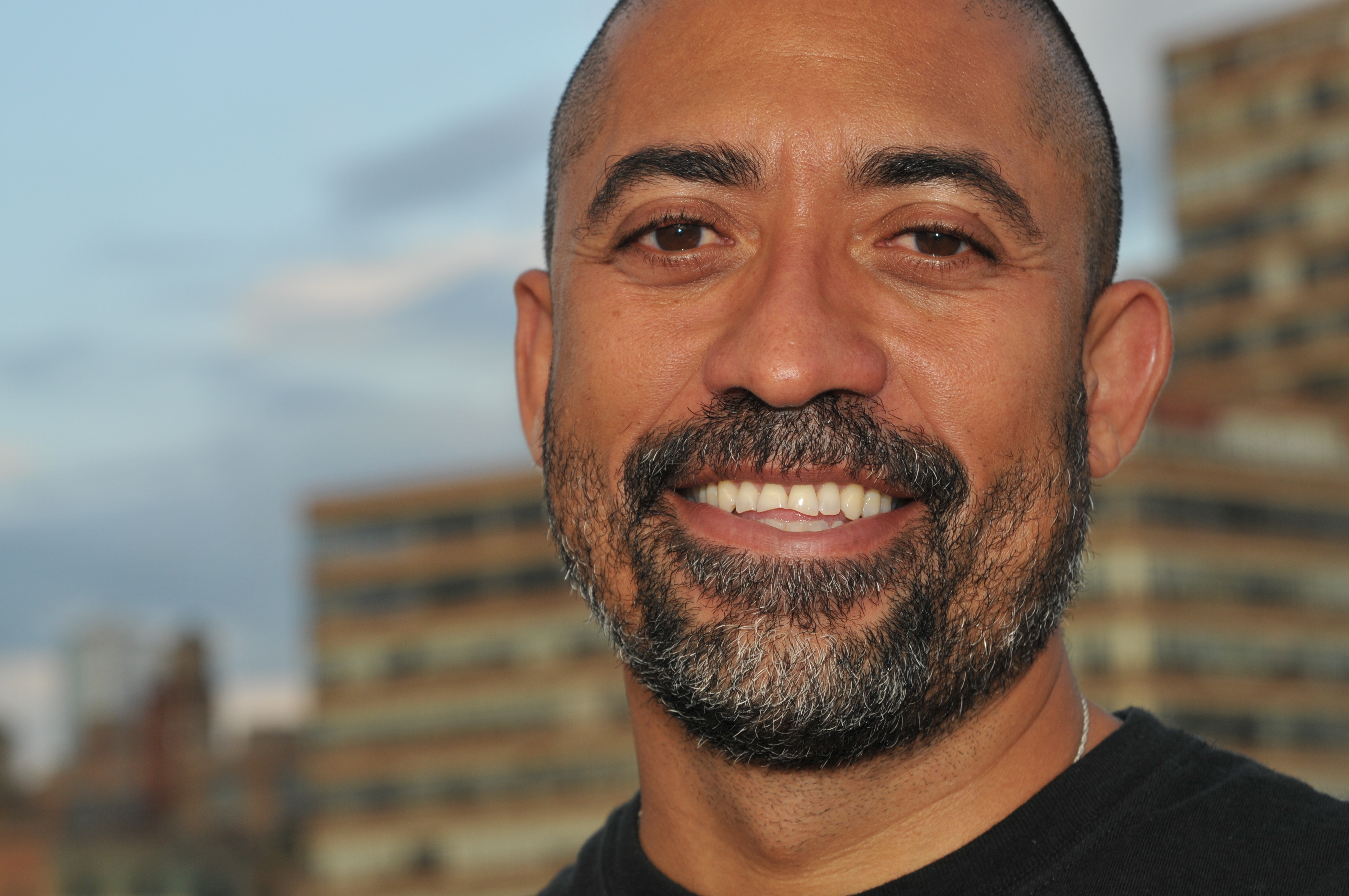The Codefather

Barbadian Alan Emtage, inventor of the world's first Internet search engine. Photo by Michael Rhodes. Used with permission.
“I wrote a piece of code that gave birth to a multi-billion dollar industry. I didn’t make any money off of it, but I wouldn’t change anything.”
Uttered by a man with a Barbadian lilt, those were the opening lines of the Huffington Post video released last April that introduced many in the Caribbean to Alan Emtage, the 48 year-old computer scientist who did indeed write the piece of code that gave birth to a multi-billion dollar industry called Internet search.
Whenever we use a search engine such as Google, we’re referencing the work of Emtage, who, in spite of only recently being discovered by his home region, is a bona fide tech pioneer. His invention, in 1990, of Archie, the world’s first search engine, figures in any respectable account of the history of the Internet.
Born in Barbados in 1964, Emtage was raised in an extended family that instilled in him a strong curiosity and “capacity for discovering stuff”. Especially influential were his mother’s aunts. Aunt Constance Inniss, a science teacher and headmistress of St. Gabriel’s School, encouraged him to listen to the BBC’s science programs and took him fishing on the sea wall near the family home at Carlisle Bay, where they’d discuss what they saw and caught. Emtage remembers her once waking him at 3am to see a comet.
At Harrison College, one of Barbados’ elite secondary schools, Emtage found himself in another positive learning environment. He followed the science track, pursuing Maths, Physics and Chemistry at ‘A’ Levels, and was attracted to computers fairly early on, acquiring a Sinclair ZX81 with a whopping 1K of memory during a visit to the UK in 1981. But computers weren’t an automatic first choice as a profession. At McGill University in Montreal, where Emtage went in 1983 after winning a Barbados Scholarship, several career options presented themselves. He considered majoring in Meteorology, and after coming near the top of the class in an introductory course in Geology he was personally wooed by that department’s chairman.
Emtage admits he chose computer science by a process of elimination. Uninspired by the prospect of “spending my time up in the Tundra poking around for diamonds”, or languishing in “a radar station in St. James” as a meteorologist in the Barbados, he also felt that computer science was a career with legs. “In 1983 we were at the bottom of a fairly bad recession and computers were one of the things that looked promising, at least from an employment point of view,” he says.
After completing his undergraduate degree in 1987, Emtage entered McGill’s Master’s program. As a postgraduate student and sysadmin (systems administrator) in the university’s IT department, he enjoyed a privileged position, with access to the latest in computer technology and a unique vantage point on the nascent phenomenon called the Internet, not to mention membership in a community of expert programmers. The mid-1980s to early 1990s were an exciting time to be a computer science major at a North American university, particularly a prestigious one like McGill. The university had the first Internet connection in eastern Canada and the second in the country. Microcomputer prices were dropping and companies like Sun Microsystems and Steve Jobs’ NeXT Computer were targeting the higher education market; NeXT made what was then its largest ever sale when McGill purchased 50 of their machines.
Still, computers back then were a far cry from what they are today. Computing tasks were carried out by a central mainframe computer, a massive machine usually housed in a general-purpose computing facility. You submitted your task to the mainframe, where it sat in a queue awaiting its turn to be processed. Computer scientists like Emtage spent hours waiting for printers to crank out their jobs on massive sheets of dot-matrix paper.
This was the context in which Emtage wrote the code that would become Archie, the world’s first search engine. His job as sysadmin involved finding software for students and faculty, which meant manually searching computer archives on public servers, a tedious process if there ever was one. Emtage wrote Archie to automate the process and make his own life easier: “Rather than spending my time logging on to FTP sites and trying to figure out what was on them, I wrote some computer scripts that would do the same thing, and much faster too.”
That, in a nutshell, is what’s happening behind the scenes each time we do a Google search, but when Emtage developed Archie in 1989 it must have seemed like magic. Word about the tool spread rapidly thanks to Emtage’s colleague Peter Deutsch, head of McGill’s IT department, who suggested they make the tool public and allow external users to log in for themselves. Archie went viral across Canada, then the world. “There was a lot of pent-up demand,” Emtage says. “Everybody was like ‘Oh my God—of course! Why didn’t we think of this?’”
Others had in fact come up with similar ideas, as is often the case with scientific discoveries. “I had several people, very soon after the fact, tell me that they were doing similar things for themselves but that they had never taken the path to making it public,” says Emtage. “I just happened to get there first and, as there was no commercial competition at the time, there was no incentive for them to replicate it.”
In 1990, Emtage and Peter Deutsch formed Bunyip, a company designed to market a more robust commercial version of Archie—also the first Internet startup in history, in that it was the first company designed expressly to sell an Internet-related service.
As Deutsch had a family, it fell to Emtage to do the work of promoting Bunyip and Archie. “I had an amazing experience travelling around the world to conferences and meetings, meeting all of the people who created the Internet,” he says. As a founding member of the Internet Society and member of the Internet Engineering Task Force, Emtage worked alongside figures such as Sir Tim Berners-Lee, Vint Cerf and Jon Postel.
But the revolution ended up passing Bunyip by. Montreal had a few tech companies, but lacked Silicon Valley’s nurturing ecosystem and community. Emtage and his partners held differing views regarding outside investment in the company (he was in favour). In 1996, a burned-out Emtage left on a three-month backpacking trip around the South Pacific; on returning to Montreal in late 1996, he resigned. A stint working for a Bunyip client lasted a year, after which he joined Mediapolis, the New York web design firm that has been his home for the last 15 years.

Alan Emtage skydiving in Brazil. “Computers are my profession. But they are not my hobby.” Photo courtesy Alan Emtage.
About the alleged missed opportunity to have cashed in with Archie and achieved near-bottomless wealth and fame, Emtage is both modest and philosophical. “Sure, I’d love to have been a billionaire,” he says. “But you don’t get to twist one knob of the time machine and make one thing change: twisting that knob changes everything else. It is not necessarily clear to me that I could have become a billionaire. If I had patented those technologies, perhaps. It is also possible that I would not have been visionary enough to word the patents broadly enough. The first past the post do not necessarily become the most successful. Google was by far not the first search engine, or even the first web search engine. They just did search so much better than their predecessors that they were able to create a multi-billion dollar industry out of it.”
It’s also possible that the quality-of-life trade-offs involved in becoming a billionaire would not have suited Emtage’s temperament. Contrary to the geek stereotype, computers aren’t his life, or even his hobby, as he’s quoted as saying on the “Greatest McGillians” web site. After the dotcom crash of 2000-2001 and the events of 9/11, Emtage and his three partners at Mediapolis took the decidedly un-billionaire-like decision to scale the company down from 17 employees to just the four of them.
The arrangement has given Emtage the freedom to pursue his passions—travel and photography—and spend time at his cottage in idyllic Provincetown, Massachusetts. Also to take a keen interest in certain aspects of technology and US politics. “Off the top of my head I can think of myself as being a minority in four or five different ways,” he says. “And the Internet is my baby, in sense that it’s only five years younger than me. So I have a great interest in intellectual property law, which I think it fundamentally broken, and civil liberties.”
But being part of a four-man outfit also means that there’s “nobody to bump it up to,” Emtage says. “It’s weird for some people that as far along as I am in my career, or in age, I’m still coding and I’m still talking with clients. But I don’t want any of the other stuff. I don’t want to deal with the corporate bullshit and office politics. These are three people that I know very well and I’ve worked with for many years. I know plenty of people who are miserable in their lives—I just try not to be one of them.”
Georgia Popplewell (@georgiap) (is a writer and media producer from Trinidad and Tobago, and Managing Director of Global Voices. A version of this article originally appeared in Caribbean Beat Magazine.
The Bridge features personal essays, commentary, and creative non-fiction that illuminate differences in perception between local and international coverage of news events, from the unique perspective of members of the Global Voices community. Views expressed do not necessarily represent the opinion of the community as a whole. All Posts
Categories
Support our work
Global Voices stands out as one of the earliest and strongest examples of how media committed to building community and defending human rights can positively influence how people experience events happening beyond their own communities and national borders.
Please consider making a donation to help us continue this work.








3 comments
This skydiving looks epic. Who would have though an NYC web designer could get so extreme in Brazil? On http://digimix.us I saw some more action sports loving developers.